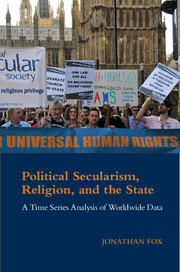Book contents
- Frontmatter
- Contents
- Acknowledgments
- 1 Introduction
- 2 Secularism or Secularization? The Secular-Religious Competition Perspective and Beyond
- 3 Establishment, Support, Neutrality, or Hostility: The Varieties of Official Religion Policy
- 4 State Support for Religion
- 5 Regulation, Restriction, and Control of the Majority Religion or All Religions
- 6 Religious Discrimination
- 7 Education, Abortion, and Proselytizing
- 8 Religion in Constitutions
- 9 Conclusions
- Appendix Data Collection and Reliability
- Bibliography
- Index
1 - Introduction
Published online by Cambridge University Press: 05 May 2015
- Frontmatter
- Contents
- Acknowledgments
- 1 Introduction
- 2 Secularism or Secularization? The Secular-Religious Competition Perspective and Beyond
- 3 Establishment, Support, Neutrality, or Hostility: The Varieties of Official Religion Policy
- 4 State Support for Religion
- 5 Regulation, Restriction, and Control of the Majority Religion or All Religions
- 6 Religious Discrimination
- 7 Education, Abortion, and Proselytizing
- 8 Religion in Constitutions
- 9 Conclusions
- Appendix Data Collection and Reliability
- Bibliography
- Index
Summary
The rules of etiquette declare that religion and politics are topics that should be avoided in polite conversation. Perhaps this is because both engender strong, uncompromising opinions and can result in heated disagreements. This is certainly the case for opinions regarding the proper role of religion in government. Contemporary politics in countries across the world include spirited and often high-stakes debates over government religion policy ranging from debates over specific policies such as religious education in public schools to the larger issue of whether a state should in general support, restrict, or be neutral toward religion. These debates are complicated by the fact that there are differing opinions on what exactly is meant by neutrality toward religion, not to mention the proper religion for a state to support.
In this study, I take no position on any of these normative debates over the role religion ought to play on government. Rather, I focus on the question of what role religion does play in government. Specifically, I focus on 111 types of government religion policies in 177 countries between 1990 and 2008.
Nonetheless, these normative debates overshadow this study. This clash of opinions is fought not only within intellectual circles and debate clubs. The question of how a government should relate to religion is a critical political issue that has been the object politics at all levels of government. This debate has involved the full range of legitimate political activity, including elections, lobbying campaigns, organized protests, and wrangling over policy within legislatures and governments. It has also involved most forms of politically motivated violence, including riots, terrorism, and civil wars. The government religion policies that are the object of this study are essentially the outcomes of these political struggles.
In fact, I posit that each country is potentially an arena for this conflict. In particular, political secularism – which I discuss in more detail in Chapter 2 and define as an ideology or set of beliefs advocating that religion ought to be separate from all or some aspects of politics or public life (or both) – is competing with religion over this aspect of the public agenda.
- Type
- Chapter
- Information
- Political Secularism, Religion, and the StateA Time Series Analysis of Worldwide Data, pp. 1 - 15Publisher: Cambridge University PressPrint publication year: 2015

